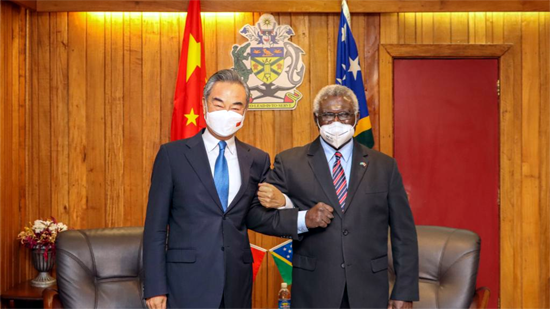CGTN
Chinese State Councilor and Foreign Minister Wang Yi has started a 10-day journey to the South Pacific. According to Chinese Foreign Ministry spokesperson, the Foreign Minister is also scheduled to chair the 2nd China-Pacific Island Countries Foreign Ministers’ Meeting while in Fiji on May 30.
Wang’s South Pacific travel has raised some concerns, particularly from Australia and the U.S. Seeing the travel as part of China’s efforts to “increase its influence in the region of the world where Australia has been the security partner of choice since the World War II,” the newly-elected Australian Prime Minister Anthony Albanese argued that Australia must respond to it during an interview with Australia Broadcasting Corporation on May 26 when Wang Yi started his visit.
It is obvious, judging from Albanese’s remarks, that Australian government has been pursuing exclusive, if not hegemonic, foreign policies towards the South Pacific which it deems as its “backyard” and “sphere of influence.” As per this logic, Australia believes that any initiative introduced by China could be interpreted as Beijing’s “ambitions” to expand its “sphere of influence” in the region and inevitably undermine Canberra’s national interests. But one could hardly come to such conclusion by China’s move including Wang Yi’s visit to the region.
Take, for instance, China-Solomon Islands relations. In view of its own national interests, Solomon Islands switched its diplomatic recognition from the Taiwan region to the Chinese mainland on the basis of one-China principle in 2019. The past few years have witnessed rapid economic development between China and the island country, partly due to the latter’s urgent demands for infrastructure and vaccines against the COVID-19 pandemic.
However, large scale anti-government demonstrations broke out in the island country in November 2021 due to multiple domestic and foreign factors. Many Chinese nationals in Chinatown area of Honiara suffered serious property loss. As a consequence, China and Solomon Islands signed a security deal earlier this year. The pact aims to “beef up the police’s ability to respond to crises” mentioned above, as the island country’s Prime Minister Manasseh Sogavare explained to the parliament in April.
But the U.S. and Australia took advantage of this “controversial” pact and kept hyping up the so-called “China military threat,” claiming that China intends to establish a military base in Solomon Islands and attempts to expand its “sphere of influence” that would eventually undermine the regional security order. In addition to diplomatic rhetoric, the two countries also resorted to actions to push an anti-China agenda.
For example, the new Australian Foreign Minister Penny Wong paid a visit to Fiji on May 26 before Wang Yi and warned the South Pacific island countries that the security pact signed by Solomon Islands and China has “regional consequences.” The U.S. then announced on May 27 that Fiji would become the 14th founding member of the Indo-Pacific Economic Framework (IPEF), a new mechanism designed to exclude and contain China in terms of economy and trade.
In effect, the recent U.S.-proposed IPEF would provide nothing substantive to the economic and social development of Fiji, the first South Pacific island country included in this framework. It is mainly because that the economic framework is still in its infancy and is yet to be further developed. Most critically, the framework seems to be attractive to countries that enjoy complete industrial structures and high-level economic development, such as Australia and New Zealand. Apparently the sparsely populated and highly vulnerable island countries like Fiji are short of these advantages.
The fact, therefore, is that the U.S. incorporation of Fiji into its economic framework is an exclusive diplomatic agenda to balance the rapidly developing bilateral relations between China and the South Pacific island countries. This indicates the policy dilemma the U.S. and its Australian ally confront. On the one hand, they are showing greater concerns about an expanded role China plays in the region. On the other hand, however, their exclusive policy measures would bring almost nothing but negative consequences to the highly vulnerable region.
Diverse foreign policy ideals explain different policy outcomes. While China pursues equal, mutual-benefit and win-win diplomatic relations with these island countries based on its overall assessment of their special national conditions, the U.S. and Australia unilaterally impose their own will on these countries. This is the main reason why China could achieve such rapid and stable development with its South Pacific partners in recent years.
Wang Yi’s South Pacific visit aims to enhance the bilateral economic and security connections between China and countries in the region. It reflects China’s adherence to a win-win diplomacy serving both sides’ interests. China-initiated inclusive agendas leading to win-win cooperation are more urgently needed than ever for countries in the region where they are more likely to suffer vulnerabilities in near future when the pandemic is still raging.





